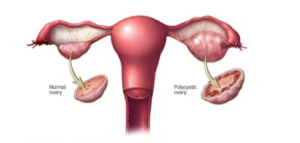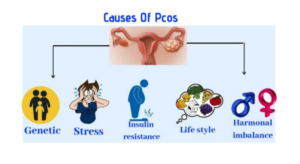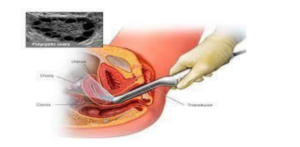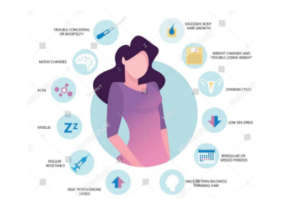What is PCOS?

PCOS- (Polycystic ovary syndrome) is a hormonal disorder common in women of reproductive age. These women may have infrequent menstrual periods and excess male hormone (androgen) levels seen as acne with excessive hair growth on various body parts. The ovaries may be enlarged with numerous small cysts (fluid filled follicles) preventing regularly egg development and release(ovulation problem). PCOS is known as a syndrome due to its long term implications on various organs of the body like the heart, kidneys etc., leading to Diabetes, Hypertension in the older ages

Where does PCOS come from?
The exact cause of PCOS is unknown, though genes and environment are thought to play a major role. PCOS may also run in families and is common for sisters, mother and daughters to have PCOS. It is related to abnormal hormone levels, especially Insulin, controlling the sugar levels in the body. This in turn increases male hormones in female body. Being overweight also increases Insulin levels.

How is it evaluated?
There is no definitive test to diagnose PCOS. A medical history of irregular menstrual periods, weight change, excess hair growth, acne etc. are indicative of possibility of PCOS. Investigations like hormone levels, pelvic(internal) scan are advised to confirm PCOS. In PCOS women, various hormones like Fasting Insulin, AMH are deranged. On ultrasound examination, the ovaries appear enlarged with plenty of small follicles(>25) arranged in the periphery of the ovaries, giving it a “String of beads” appearance

How is it treated?
There is no cure for PCOS, however, the various symptoms can be treated. In overweight PCOS- weight reduction, healthy, balanced diet. Medication to treat excessive hair and acne. Regularisation of cycles with hormonal tablets Fertility medicines to enable ovulation Surgical laparoscopic ovarian drilling in longstanding and resistant PCOS All treatment modalities are temporary and only a healthy daily lifestyle routine of balanced diet and exercise can keep PCOS under control, preventing the futuristic complications.

What are the symptoms?
Irregular periods or no periods at all Weight gain, Excessive hair growth (Hirsutism) especially over face, chest, back and buttocks Oily skin with excessive pimples (acne), Thinning and loss of hair on the head. Difficulty getting pregnant
What do irregular periods mean and what should I do about it?
In PCOS, the normal menstrual cycle of 28-35 days is prolonged to 2-3 months. This is due to lack of egg development and ovulation. Cycles can be regularised with hormonal pills. Ovulation can be achieved with certain medications and monitored on scans
If I have heavy periods-why it happens?
In PCOS, despite irregular periods, bleeding could be excessive and heavy with clots after a long gap of 2-3 months. This is also due to hormone imbalance and can be we managed with the help of certain medications.
If I have prolonged periods-why it happens?
In PCOS, despite irregular periods, bleeding could be prolonged for 10-15 days after a long gap of 2-3 months. The hormonal imbalance leads to this and it can be controlled with the help of certain hormonal medications.
If I have painful periods-what does it mean?
Painful periods is a normal features in almost every woman during menstruation. However, if anyone with PCOS experiences excessive pain, analgesics can be prescribed after complete evaluation and excluding any other cause of the pain.




